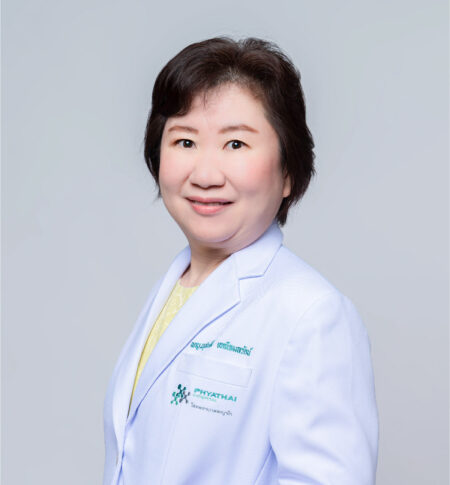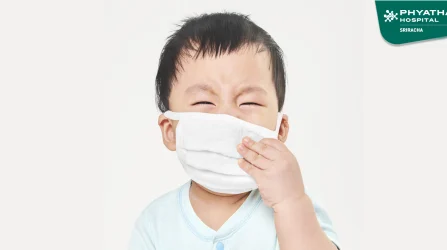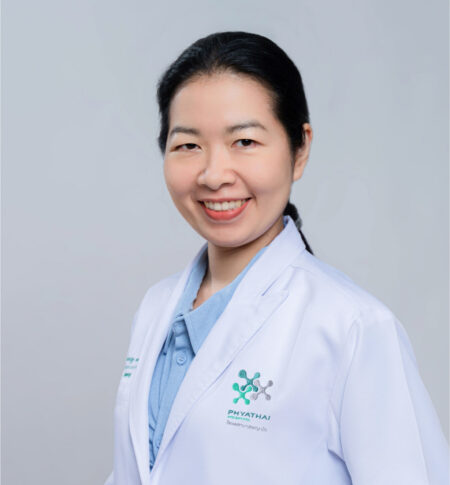
Dr. Nutnatee Akkomonrat
"The doctor emphasizes explaining the disease to parents, helping them understand the treatment process and the recovery period for each condition. Sometimes, it's not just about explaining to the parents alone; when other relatives are involved, additional explanations are also necessary. The doctor believes that when knowledge and understanding are shared, everyone is more prepared to work together to take care of the children with much more comfort."
After completing a Bachelor of Medicine from the Faculty of Medicine Siriraj Hospital, Mahidol University, Dr. Nutnatee Akkomonrat continued her studies to obtain a Pediatric Medicine Specialist Certificate at Chonburi Hospital. She further expanded her expertise by pursuing a certificate in Pediatric Pulmonology at Ramathibodi Hospital. The doctor talked about her inspiration and experiences during her studies.
“As a person, I already had a fondness for children, and during my time as a medical student, I had a pediatrician as a mentor who was very capable. I was deeply impressed when I saw this mentor save the lives of infants and pediatric patients. So, I wanted to become a skilled pediatrician like them.”
Once she became a pediatrician, she initially intended to specialize in pediatric nephrology. However, after she had the opportunity to observe cases at Ramathibodi Hospital, she realized the importance of respiratory system-related diseases and the increasing occurrence of such conditions in children due to environmental factors, pollutants, and other variables. At that time, there was a shortage of medical professionals in this area, so she decided to switch her focus and pursue further studies in this field.
Caring for and treating respiratory diseases in children is her primary responsibility. At Phyathai Sriracha Hospital, most of the pediatric patients she sees have problems related to allergies, respiratory allergies, asthma, and respiratory infections such as colds and chronic coughs. Apart from infectious diseases, she also frequently encounters sleeping problems. If a patient’s condition is severe, she collaborates with ENT specialists to plan the treatment together.
Regarding the scope of pediatric care, she looks after children from birth up to around 14 or 15 years old. The treatment primarily involves administering medications, but in some cases, procedures like nasal endoscopy may be required as part of the diagnostic process for certain diseases.
Understanding Children, Understanding Parents, Because Doctors are Like Mothers Too
When taking care of patients, there are times when children might be hesitant and uncooperative during examinations or treatments. In such cases, doctors rely on their calm demeanor, understanding, and various strategies to handle different situations.
“First and foremost, we need to understand that when children come to see the doctor, they are often not feeling well. Therefore, their emotional state might be irritable, unhappy, or uncomfortable due to their illness. When we understand their emotional state and developmental stage, we can better handle the situation. As doctors, we act like mothers and do our best to treat our patients just as we would with our own children. The assisting team, including nurses and parents, plays a significant role in helping children relax and cooperate during the process. In our department, we also provide toys for the children.”
In cases where parents may feel frustrated, it’s fortunate that doctors are also like mothers, enabling them to understand the feelings of the parents when their children are unwell. Doctors focus on explaining to parents about the illness, the treatment process, and the expected recovery time for each disease. Sometimes, it’s not just the parents who need explanations; when other relatives are involved, additional explanations are provided. With shared knowledge and understanding, everyone is better prepared to care for the children with more peace of mind.
Close and Compassionate Care is Essential
For severe illnesses, if patients do not receive proper care, it can lead to fatal outcomes. Take, for example, dengue fever, which is an infectious disease that can be life-threatening. Although the statistics are not significantly high, attentive and detailed care and diagnosis can prevent children from reaching critical conditions.
“Dengue fever, in general, can be managed well, and most children recover without reaching a critical condition. However, in some rare cases, there might be other peculiar symptoms. I once had a young patient with dengue who showed signs of blood leakage. Monitoring blood density levels and observing the rapid heart rate helped in detecting an anomaly. Based on these observations, I suspected something was wrong and closely monitored the patient until I found the cause. Once identified, the patient was promptly treated, ensuring a safe recovery. If we are not vigilant and closely monitor such cases, it can lead to shock and become life-threatening.”











